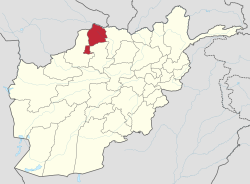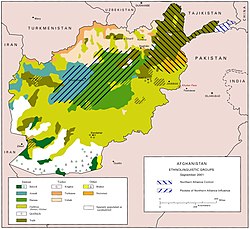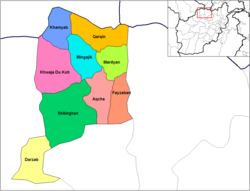This is an old revision of this page, as edited by Pratyya Ghosh (talk | contribs) at 13:08, 18 August 2014 ((Script) File renamed: File:120517-F-UZ487-005.jpg → File:A platoon of Afghan Border Police wait for their graduation ceremony to begin at Regional Training Center Sheberghan.jpg [[commons:COM:FR#reasons|File renaming crite...). The present address (URL) is a permanent link to this revision, which may differ significantly from the current revision.
Revision as of 13:08, 18 August 2014 by Pratyya Ghosh (talk | contribs) ((Script) File renamed: File:120517-F-UZ487-005.jpg → File:A platoon of Afghan Border Police wait for their graduation ceremony to begin at Regional Training Center Sheberghan.jpg [[commons:COM:FR#reasons|File renaming crite...)(diff) ← Previous revision | Latest revision (diff) | Newer revision → (diff) Place in Afghanistan| Jowzjan | |
|---|---|
 Map of Afghanistan with Jowzjan highlighted Map of Afghanistan with Jowzjan highlighted | |
| Country | |
| Capital | Sheberghan |
| Government | |
| • Governor | Alhaj Baymorad Qoyunly |
| Area | |
| • Total | 11,798 km (4,555 sq mi) |
| Population | |
| • Total | 512,100 |
| • Density | 43/km (110/sq mi) |
| Time zone | UTC+4:30 |
| ISO 3166 code | AF-JOW |
| Main languages | Uzbeki Turkmen Dari Pashto |
Jowzjan or Jozjan or Jawzjan (Template:Lang-fa Jowzjān, Template:Lang-ps) is one of the thirty-four provinces of Afghanistan, located in the north of the country bordering neighboring Turkmenistan. The province is divided into 11 districts and contains hundreds of villages. It has a population of about 512,100, which is multi-ethnic and mostly agriculturers. The capital of Jowzjan province is Sheberghan.
History
Further information: History of AfghanistanBetween the early 16th century and mid-18th century, the area was ruled by the Khanate of Bukhara. It was conquered by Ahmad Shah Durrani in or about 1747 and became part of the Durrani Empire, which formed to the modern state of Afghanistan. The area was untouched by the British during the three Anglo-Afghan wars that were fought in the 19th and 20th centuries.
Recent history
Following a series of changing allegiances and falling out with Uzbek warlord Abdul Malik Pahlawan in 1997, the Taliban withdrew from the area, but in 1998 a contingent of 8,000 Taliban troops pressed through neighboring Faryab, seizing Abdul Rashid Dostum's headquarters in Sheberghan.

Swedish-led Provincial Reconstruction Team (PRT), which has been based in Mazar-i-Sharif since about 2005 and responsible for four provinces including Jowzjan, established an office and some troops in the province. Security situation in the province has rapidly deteriorated in 2009 and 2010. A new Turkish PRT has also been established in the province in the summer of 2010, working area of which also covers Sar-e Pol. The Afghan National Security Forces (ANFS) began expanding in the last decade and slowly took over security from International Security Assistance Force (ISAF). The Afghanistan-Turkmenistan border is maintained by the Afghan Border Police (ABP) while law and order for the rest of the province is provided by the NATO-trained Afghan National Police (ANP).
Although it can be regarded as a relatively secure place compared to those in the southern provinces of Afghanistan, there is an increasing number of incidents particularly in Darzab, Qush Tepa and Fayzabad districts. The Mazar-i-Sharif-Sheberghan highway (called Aqyol) has turned into a dangerous traveling route because of militants carrying out attacks against government forces, NGO workers and civilians.
In April 2012 construction of a mega power network with power pylons carrying 500 megawatts of electricity from neighboring Turkmenistan started in the province; the project is supported by Turkmenistan and Turkey. Initial work on the $390 million project had already been completed. Turkmenistan will install power pylons over a distance of 374 kilometres on its soil toward the Afghanistan border and the project will take a year to complete. The network would supply electricity to many areas in Jowzjan, Balkh, Sar-e Pul, Faryab and Kabul provinces.
Politics and governance
Further information: List of governors of JowzjanThe Governor of the province is Alhaj Baymorad Qoyunly, who replaced Mohammad Aleem Sayee in July 2013. Qoyunly was senator from his province Jawzjan.
All law enforcement activities throughout the province are controlled by the Afghan National Police (ANP). The police chief represents the Ministry of the Interior in Kabul. The ANP is backed by other Afghan National Security Forces (ANSF), including the NATO-led forces.
Healthcare
The percentage of households with clean drinking water increased from 24% in 2005 to 44% in 2011. The percentage of births attended to by a skilled birth attendant increased from 9% in 2005 to 21% in 2011.
Education
The overall literacy rate (6+ years of age) fell from 31% in 2005 to 16% in 2011. The overall net enrolment rate (6–13 years of age) increased from 40% in 2005 to 46% in 2011.
Geography and demographics
Further information: Geography of Afghanistan and Demography of Afghanistan

Jowzjan is situated in the northern part of Afghanistan, bordering Turkmenistan in the north, Balkh Province in the east, Sar-e Pol Province in the south and Faryab Province in the west. The province covers an area of 10326 km2. More than one quarter of the province is mountainous or semi mountainous terrain (29.4%), while more than two thirds of the area is made up of flat land (68.9%). It is one of the provinces known to contain petroleum and natural gas. Mining and agriculture are the main industries.
The population of Jowzjan is about 512,100, which is multi-ethnic and mostly agriculturers. The main ethnic groups living in the province are Turkmen followed by Uzbek, Pashtun, Tajik and possibly a few others. Occasional ethnic violence are reported in the area, the last one in 2002.
The languages spoken in the province are Turkmeni, Uzbeki, Dari, and Pashto.
Districts
| District | Capital | Population | Area | Number of villages and ethnic groups |
|---|---|---|---|---|
| Aqcha | Sub-divided in 2005 | |||
| Darzab | ||||
| Fayzabad | ||||
| Khamyab | ||||
| Khaniqa | Created in 2005 within Aqcha District | |||
| Khwaja Du Koh | ||||
| Mardyan | ||||
| Mingajik | ||||
| Qarqin | ||||
| Qush Tepa | Created in 2005 within Sheberghan District | |||
| Sheberghan | Sub-divided in 2005 |
Notable people
- Abu 'Ubayd al-Juzjani, the famous pupil of Avicenna, was from Jowzjan
- Abdul Rashid Dostum, former mujahid and a general in the Afghan National Army, is from Hodja Dukhu village of Jowzjan
See also
References
- ^ "Settled Population of Jowzjan province by Civil Division, Urban, Rural and Sex-2012-13" (PDF). Islamic Republic of Afghanistan, Central Statistics Organization. Retrieved 2012-10-22.
- ^ University of Montana, Jowzjan: "Jowzjan is an energy-rich province in northern Afghanistan that is bordered by Turkmenistan. Although it has a probable Uzbek majority, Jowzjan also has substantial numbers of Turkmen, Pashtuns and Tajiks."
- Larry P. Goodson (2001). Afghanistan's endless war: state failure, regional politics, and the rise of the Taliban. University of Washington Press. pp. 79–. ISBN 978-0-295-98050-8. Retrieved 30 March 2011.
- http://www.wadsam.com/power-network-in-jawzjan/
- "Jawzan gets new governor". Pajhwok Afghan News. 20 July 2013. Retrieved 14 July 2014.
- ^ Archive, Civil Military Fusion Centre, https://www.cimicweb.org/AfghanistanProvincialMap/Pages/Jowzjan.aspx
- http://www.hewad.com/news2.htm
- "Jowzjan Province". Government of Afghanistan and United Nations Development Programme (UNDP). Ministry of Rural Rehabilitation and Development. Retrieved 2012-10-22.
External links
| Places adjacent to Jowzjan Province | ||||||||||||||||
|---|---|---|---|---|---|---|---|---|---|---|---|---|---|---|---|---|
| ||||||||||||||||
| Provinces of Afghanistan | ||
|---|---|---|